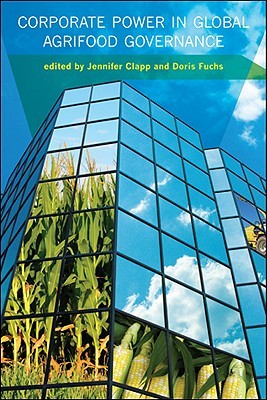
- We will send in 10–14 business days.
- Publisher: MIT Press
- ISBN-10: 0262512378
- ISBN-13: 9780262512374
- Format: 15 x 22.6 x 1.8 cm, softcover
- Language: English
- SAVE -10% with code: EXTRA
Corporate Power in Global Agrifood Governance (e-book) (used book) | bookbook.eu
Reviews
Description
Experts examine the ways transnational corporations exercise power over governance of the global food system and the implications this has for sustainability
In today's globally integrated food system, events in one part of the world can have multiple and wide-ranging effects, as has been shown by the recent and rapid global rise in food prices. Transnational corporations (TNCs) have been central to the development of this global food system, dominating production, international trade, processing, distribution, and retail sectors. Moreover, these global corporations play a key role in the establishment of rules and regulations by which they themselves are governed. This book examines how TNCs exercise power over global food and agriculture governance and what the consequences are for the sustainability of the global food system. The book defines three aspects of this corporate power: instrumental power, or direct influence; structural power, or the broader influence corporations have over setting agendas and rules; and discursive, or communicative and persuasive, power. The book begins by examining the nature of corporate power in cases ranging from "green" food certification in Southeast Asia and corporate influence on U.S. food aid policy to governance in the seed industry and international food safety standards. Chapters examine such issues as promotion of corporate-defined "environmental sustainability" and "food security," biotechnology firms and intellectual property rights, and consumer resistance to GMOs and other cases of contestation in agrobiology. In a final chapter, the editors raise the crucial question of how to achieve participation, transparency, and accountability in food governance.
Contributors
Maarten Arentsen, Jennifer Clapp, Robert Falkner, Doris Fuchs, Agni Kalfagianni, Peter Newell, Steffanie Scott, Susan Sell, Elizabeth Smythe, Peter Vandergeest, Marc Williams, Mary Young
EXTRA 10 % discount with code: EXTRA
The promotion ends in 20d.18:05:09
The discount code is valid when purchasing from 10 €. Discounts do not stack.
- Publisher: MIT Press
- ISBN-10: 0262512378
- ISBN-13: 9780262512374
- Format: 15 x 22.6 x 1.8 cm, softcover
- Language: English English
Experts examine the ways transnational corporations exercise power over governance of the global food system and the implications this has for sustainability
In today's globally integrated food system, events in one part of the world can have multiple and wide-ranging effects, as has been shown by the recent and rapid global rise in food prices. Transnational corporations (TNCs) have been central to the development of this global food system, dominating production, international trade, processing, distribution, and retail sectors. Moreover, these global corporations play a key role in the establishment of rules and regulations by which they themselves are governed. This book examines how TNCs exercise power over global food and agriculture governance and what the consequences are for the sustainability of the global food system. The book defines three aspects of this corporate power: instrumental power, or direct influence; structural power, or the broader influence corporations have over setting agendas and rules; and discursive, or communicative and persuasive, power. The book begins by examining the nature of corporate power in cases ranging from "green" food certification in Southeast Asia and corporate influence on U.S. food aid policy to governance in the seed industry and international food safety standards. Chapters examine such issues as promotion of corporate-defined "environmental sustainability" and "food security," biotechnology firms and intellectual property rights, and consumer resistance to GMOs and other cases of contestation in agrobiology. In a final chapter, the editors raise the crucial question of how to achieve participation, transparency, and accountability in food governance.
Contributors
Maarten Arentsen, Jennifer Clapp, Robert Falkner, Doris Fuchs, Agni Kalfagianni, Peter Newell, Steffanie Scott, Susan Sell, Elizabeth Smythe, Peter Vandergeest, Marc Williams, Mary Young


Reviews